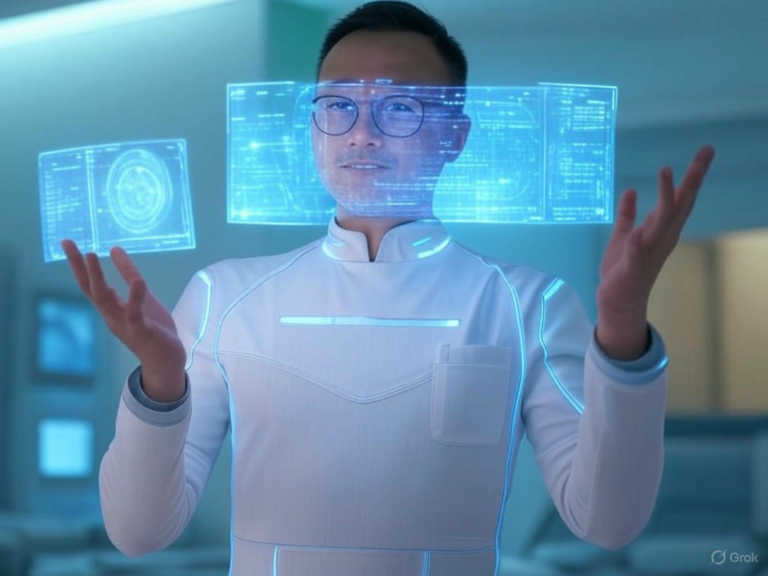
AI in Healthcare: Dr. Ami Bhatt’s Insights on AI Tools
Exploring AI in Healthcare Through Dr. Bhatt’s Vision
AI in healthcare is reshaping the medical world, and few experts understand this better than Dr. Ami Bhatt, a trailblazer in digital health and cardiology. With over two decades of experience, she’s at the helm of innovation as Chief Innovation Officer at the American College of Cardiology. Have you ever wondered how technology could make doctor visits more precise and personal? Dr. Bhatt’s insights reveal the potential of AI-driven tools to enhance diagnoses, treatments, and patient management, all while addressing the rapid growth of medical data.
In her career, Dr. Bhatt has seen AI evolve from a futuristic idea into everyday tools that support clinicians. This isn’t just about gadgets; it’s about creating systems that put patients first, ensuring healthcare reaches everyone, no matter where they are. Let’s dive deeper into how this transformation is unfolding.
The Rise of AI in Healthcare and Telemedicine
More than a decade ago, Dr. Bhatt dove into telemedicine, long before it became a necessity. She views AI in healthcare as a way to bring care directly to people’s homes, making it more accessible and tailored to real-life needs. The COVID-19 pandemic sped things up, turning virtual clinics into standard practice and sparking new workflows that blend technology with empathy. What if your next check-up could happen from your couch, guided by smart AI algorithms?
For Dr. Bhatt, telemedicine isn’t just a workaround—it’s a core strategy for patient-centered care. Referencing her early work, she notes how these tools have built stronger connections between doctors and patients. Sources like her YouTube discussion highlight how AI in healthcare has bridged gaps, especially in underserved areas, by leveraging data for proactive interventions.[1]
How AI in Healthcare is Revolutionizing Cardiology
When it comes to cardiology, AI in healthcare is a game-changer, as Dr. Bhatt explains. These tools sift through massive datasets to spot risks early, helping doctors intervene before issues escalate. Imagine an AI system analyzing your EKG in seconds, flagging abnormalities that might escape the human eye—it’s already happening and improving accuracy dramatically.
Dr. Bhatt points out key applications, like personalized treatment plans powered by machine learning. This means therapies tailored to your unique data, reducing guesswork and boosting outcomes. From early diagnosis to ongoing monitoring, AI in healthcare empowers clinicians to handle the flood of information efficiently, turning data into life-saving insights.
To make this practical, consider a clinician using AI to predict heart disease risks based on wearable device data. Dr. Bhatt emphasizes that this technology isn’t replacing doctors; it’s amplifying their expertise, leading to better research and faster advancements.
Bridging Silos with Collaboration in AI in Healthcare
Dr. Bhatt stresses that true innovation in AI in healthcare comes from teamwork. Engineers, doctors, insurers, and innovators must collaborate from the start to build tools that actually work in real settings. Ever thought about how a simple app could change heart care? It starts with co-designing solutions that address everyday clinical challenges.
By investing in seamless digital infrastructures, healthcare systems can integrate AI smoothly. Dr. Bhatt advises aligning funding with clinical needs, ensuring that venture capital drives meaningful change. A great example is how cross-disciplinary teams have developed AI tools for remote monitoring, making care more scalable and effective.
This collaborative approach not only speeds up development but also ensures AI in healthcare is ethical and user-friendly. Tips for success include starting with small pilots and gathering feedback from all stakeholders to refine tools over time.
Ethical Considerations for AI in Healthcare
While AI in healthcare promises big leaps, Dr. Bhatt is clear on the need for ethics at every step. Transparency is key—doctors and patients should understand how AI makes decisions to build trust. How can we trust a system if we don’t know how it works? That’s why explainable AI is so crucial.
Another focus is tackling biases in AI models by using diverse datasets, preventing inequalities in care. Dr. Bhatt advocates for strict safety standards and regulations to guide implementation. In essence, AI should enhance human judgment, not overshadow it, ensuring patient safety remains paramount.
For actionable advice, clinicians can start by reviewing AI tools for bias and seeking diverse input during development. Dr. Bhatt’s views align with broader discussions, like those in ethical AI frameworks, to keep technology humane and reliable.
Key AI Tools Shaping AI in Healthcare for Cardiology
Dr. Bhatt highlights specific AI tools transforming cardiology. Predictive analytics, for instance, forecasts heart risks and supports prevention strategies, potentially saving lives through early alerts. These tools analyze imaging and data in ways traditional methods can’t, offering deeper insights.
Large language models help synthesize patient information quickly, while virtual care platforms enable remote consultations. A hypothetical scenario: A patient with a heart condition uses an AI app to track vital signs, alerting their doctor to irregularities in real time. This not only improves care but also makes AI in healthcare more approachable.
Comparing Traditional and AI-Enhanced Methods in AI in Healthcare
| Aspect | Traditional Approach | AI-Enhanced Approach |
|---|---|---|
| Diagnosis Speed | Often manual and time-consuming | Automated for rapid results |
| Data Analysis | Relies on human interpretation | Leverages comprehensive AI algorithms |
| Personalization | Follows general guidelines | Customized with machine learning |
| Scalability | Limited by resources | Expanded through digital platforms |
This comparison shows how AI in healthcare is elevating standards, making processes faster and more adaptive.
Overcoming Challenges in AI in Healthcare
Despite the progress, AI in healthcare faces hurdles like data silos and interoperability issues. Dr. Bhatt calls for better integration across systems to unlock AI’s full potential. What steps can organizations take? Start by standardizing data formats and fostering partnerships.
Patient engagement is another area—building trust through clear communication and proven results. Dr. Bhatt sees opportunities in merging technology with patient-focused strategies, like using AI for community health trends. A tip: Encourage patients to use secure apps for self-monitoring to ease the transition.
Future of AI in Healthcare: Dr. Bhatt’s Forward-Looking Ideas
Looking ahead, Dr. Bhatt envisions AI in healthcare advancing risk modeling for entire communities, guiding public health efforts. Real-time monitoring via wearables could provide ongoing insights, allowing for immediate interventions. Isn’t it exciting to think about AI predicting health trends before they become crises?
Research into explainable AI will make these tools safer and more trustworthy. Dr. Bhatt promotes ecosystems where patients, clinicians, and tech experts co-create solutions. To get involved, consider exploring AI training programs or joining innovation networks.
Wrapping Up Insights on AI in Healthcare
AI in healthcare, as championed by Dr. Ami Bhatt, is poised to transform patient care and medical innovation. By prioritizing collaboration, ethics, and patient needs, we can harness these tools effectively. What are your thoughts on AI’s role in your health journey? Share in the comments, explore more on our site, or check out related articles for deeper dives.
References
- Does AI Have a Place in Virtual Health Care? Dr. Ami Bhatt. (YouTube). Link
- The Role of AI in Health Care: Innovation & Ethics Ft. Dr. Ami B. Bhatt. Link
- Q&A: Dr. Ami Bhatt on Digital Health Innovation. Link
- Artificial Intelligence in Cardiology: What You Need to Know in 2024. Link
- Stanford CRFM Report on AI in Healthcare. Link
- Other sources as referenced in the original material.
AI in healthcare, Dr. Ami Bhatt, digital health, AI tools in cardiology, telemedicine, AI innovation, ethics in AI, cardiology insights, patient care with AI, virtual health advancements







